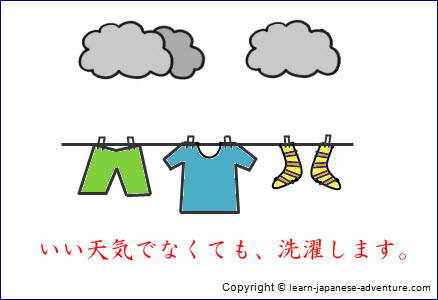- Home
- Intermediate Lessons
- Japanese Conditional Form ても (temo)
Japanese Conditional Form -
Part 2. ~ても (~temo) Sentence -
Intermediate Lessons: 25
In this lesson, you'll learn the next Japanese conditional form - ても (temo) Sentence. By definition, it simply translates to "Even if ~" in English.

ても (temo) Sentence is used to indicate a reverse condition.
It's used when an action which is expected to be taken or an event which is expected to happen naturally under the given circumstances does not materialize or a thing turns out in a way opposite to a socially accepted idea.
Sentence Patterns
Let's check out the sentence patterns for ても (temo) sentence...
| Sentence 1 (て-form) | も、 | Sentence 2 |
| Affirmative | ||
| Verb (て-form) | も、 | Sentence 2 |
| い-Adj (~ |
も、 | Sentence 2 |
| な-Adj で | も、 | Sentence 2 |
| Noun で | も、 | Sentence 2 |
| Negative | ||
| Verb ない-form (~ |
も、 | Sentence 2 |
| い-Adj (~ |
も、 | Sentence 2 |
| な-Adj でなくて | も、 | Sentence 2 |
| Noun でなくて | も、 | Sentence 2 |
Note: We called this conditional form ても (temo) sentence because it means て-form + も (te-form + mo). However, it doesn't mean it's always ても (temo), sometimes it can be でも (demo), sometimes it can be っても (ttemo), depending on what is the て-form (te-form) in Sentence 1 of the sentence structures.
Example
Let's look at an example to see how this sentence works...
Imagine you have been taking a lot of food recently. Beside the normal 3 meals, you took plenty of snacks in between meals, and ate a lot of junk foods for supper.
If you continue doing this for weeks, normally it's natural that you'll put on weight. In this case, you can use the と (to) sentence to describe the situation.
- たくさん食べると、太ります。
takusan taberu to, futorimasu
Meaning: If I take a lot of food, I will put on weight.
However, if the opposite result happens, you should use ても (temo) sentence to describe the situation.
That means you don't gain weight even if you eat a lot of food. For ても (temo) sentence, what happens is opposite to what people normally expected.
- たくさん食べても、太りません。
takusan tabetemo, futorimasen
Meaning: Even if I take a lot of food, I don't put on weight.
In summary...
| たくさん食べます | → | 太ります | ← | naturally happen | use と sentence |
| たくさん食べます | → | 太りません | ← | opposite result happen | use ても sentence |
Another Example
Normally, when the surrounding is noisy, you won't be able to sleep easily. However, if you can sleep under such noisy environment, you can then use ても (temo) sentence to describe the situation.
- うるさくても、寝られます。 (opposite)
urusakutemo, neraremasu
Meaning: Even if it's noisy, I can sleep.
うるさいと、寝られません。 (normal)
urusaito, neraremasen
Meaning: If it's noisy, I cannot sleep.
| うるさい | → | 寝られません | ← | normal | use と sentence |
| うるさい | → | 寝られます | ← | opposite | use ても sentence |
More Examples of Japanese Conditional form ても (temo) Sentence
|
1. |
一時間しか寝なくても、元気です。 (opposite) |
|
2. |
静かでなくても、勉強できます。 (opposite) |
|
3. |
いい天気でなくても、洗濯します。 (opposite) |
No Rule or Regulation for Japanese Conditional form ても (temo) Sentence
From the last example, you'll notice that the second sentence 洗濯します (sentaku shimasu) is a personal will. This is allowed in ても (temo) sentence.
In fact, as compared to と (to) sentence, this Japanese conditional form is much simpler because there is no restriction in Sentence 2.
You can have one's will, hope, judgement, permission, order, invitation or request, etc in Sentence 2. For example...
- 明日雨が降っても、サッカーします。
ashita ame ga futtemo, sakka- shimasu
Meaning: Even if it rains tomorrow, I'll play soccer.
The second sentence サッカーします (sakka- shimasu) - "to play soccer" is a personal will, but it's allowed in ても (temo) sentence.
- 授業がなくても、学校へ来てください。
jugyou ga nakutemo, gakkou e kite kudasai
Meaning: Even if you have no class, please come to school.
Even if there is no class, your teacher will still ask you to come to school. The second sentence in this example is a request form, but it's allowed here.
Summary
For Japanese conditional form ても (temo) sentence, you use it when the opposite result happens (or opposite action is taken) to what people normally expected. And there is no regulation in Sentence 2.
For と (to) sentence, one's will, hope, judgement, permission, order, invitation or request, etc cannot be used in Sentence 2.
To use all these in Sentence 2, you have to use ば (ba), なら (nara) and たら (tara) sentences which you are going to learn in next few lessons.
Related Pages
Lesson 24: と (to) Sentence.
Lesson 26: ば (ba) / なら (nara) Sentence.
Lesson 27: たら (tara) Sentence.
Lesson 28: たら (tara) Sentence Special Case.
Best Deal of the Year! Get 68% OFF Lifetime Premium! Ends on 13 Dec 2025
Click Here to Get 68% OFF Lifetime Premium and be on the fast track to fluency in Japanese.
The link above is an affiliate link, which means that I would earn a commission (at no extra cost to you) if you do end up purchasing the related learning course.
Previous - Lesson 24: Japanese Conditional Form と
Buy me a coffee









Facebook Comments
Don’t see the comments box? Log in to your Facebook account, give Facebook consent, then return to this page and refresh it.